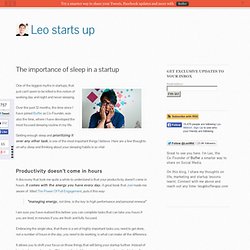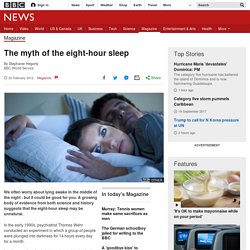

How Slight Sleep Deprivation Could Add Extra Pounds. Getting seven to eight solid hours of sleep each night might seem an almost impossible luxury to many people.

But not getting enough sleep is known to impair mental function and increase the risk for heart disease, among other ill effects. Accumulating evidence also suggests that even short-term, partial sleep deprivation could pave the way for weight gain and other negative metabolic consequences. More than 28 percent of adults in the U.S. report that they get less than six hours of sleep a night, with this cumulative deprivation becoming more common in the past three decades. And now that more than 35 percent of U.S. adults are currently obese, researchers have been searching for potential links between the two conditions, in hopes of reducing the increasing health and economic burden of obesity.
To sleep, perchance to eat less Perhaps some of the best-documented effects of sleep deprivation on weight are based on two powerful hormones: ghrelin and leptin. The importance of sleep in a startup. One of the biggest myths in startups, that just can’t seem to be killed is this notion of working day and night and never sleeping.

Over the past 12 months, the time since I have joined Buffer as Co-Founder, was also the time, where I have developed the most focused sleeping routine in my life. Getting enough sleep and prioritizing it over any other task, is one of the most important things I believe. Here are a few thoughts on why sleep and thinking about your sleeping habits is so vital: Productivity doesn’t come in hours A discovery that took me quite a while to understand is that your productivity doesn’t come in hours.
“managing energy, not time, is the key to high performance and personal renewal” I am sure you have realized this before: you can complete tasks that can take you hours if you are tired, in minutes if you are fresh and fully focused. It allows you to shift your focus on those things that will bring your startup further. Escape Parkinson’s Law with more sleep. The myth of the eight-hour sleep. Image copyright Other We often worry about lying awake in the middle of the night - but it could be good for you.

A growing body of evidence from both science and history suggests that the eight-hour sleep may be unnatural. In the early 1990s, psychiatrist Thomas Wehr conducted an experiment in which a group of people were plunged into darkness for 14 hours every day for a month. It took some time for their sleep to regulate but by the fourth week the subjects had settled into a very distinct sleeping pattern. They slept first for four hours, then woke for one or two hours before falling into a second four-hour sleep.
Though sleep scientists were impressed by the study, among the general public the idea that we must sleep for eight consecutive hours persists. In 2001, historian Roger Ekirch of Virginia Tech published a seminal paper, drawn from 16 years of research, revealing a wealth of historical evidence that humans used to sleep in two distinct chunks. Image copyright bbc.